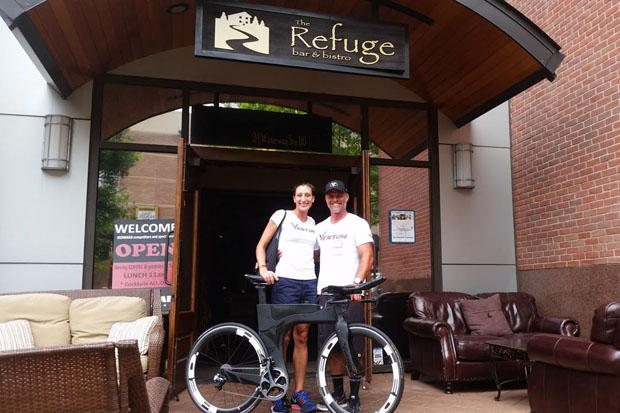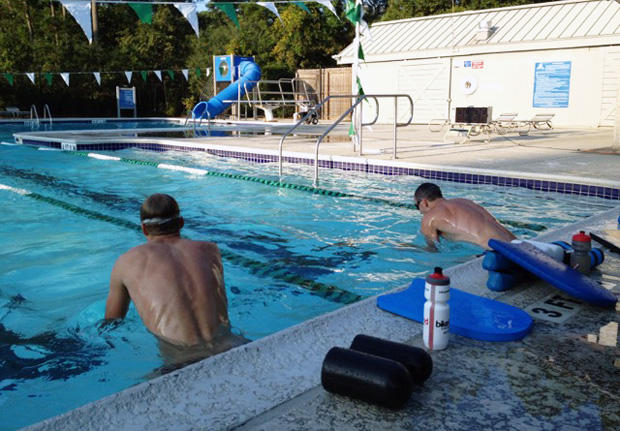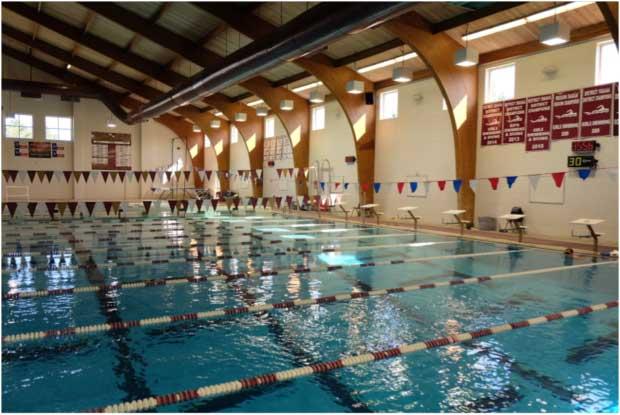The Marathon Squared Challenge
For the better part of the last decade, longtime swim coach Tim Floyd has worked tirelessly to grow the open water swimming community through his Magnolia Masters program. He’s also offered pro triathletes looking to improve their swim leg dedicated training blocks before the season ramps up and again leading into Kona. Floyd’s Snapping Tortuga open water swim races give athletes a final opportunity to see how their pool training translates into the open water. Yet, in a year without Kona, and on a weekend when yet another tropical storm is battering the neighboring Gulf States, Floyd is offering up his greatest challenge yet, The Marathon Squared Challenge.
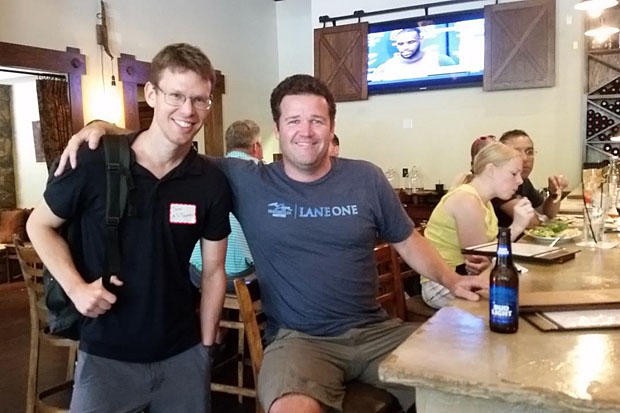
An athlete must complete a 10K open water swim, without aid of wetsuit, paddles or fins in less than three hours, and follow that up with a marathon in less than three hours. On the surface this challenge seems doable, yet since it’s conception in 2012, no one has succeeded. On Sunday, October 11th, in and around Lake Conroe, in Montgomery, Texas, Floyd has persuaded three multiple-time Ironman winning pros, Matt Hanson, Justin Daerr and Lisa Roberts, to take up the challenge. During any other year, top athletes might be nursing their sore bodies after Kona, but in a year without racing when challenges like Everesting, FKT and KOM attempts have served as headline acts for a content-starved fanbase, swimmers who run, or visa versa, now have a meaty challenge to tackle.
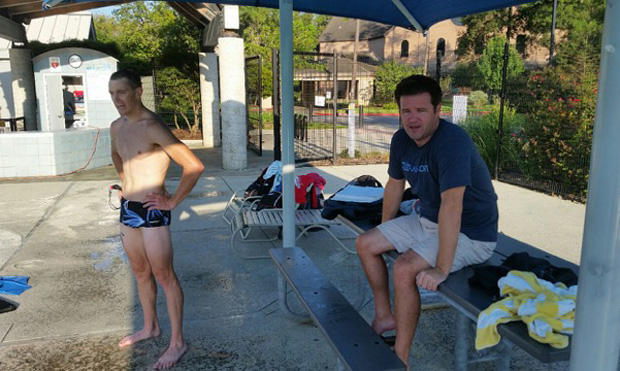
Slowtwitch: How did you learn of the Marathon Squared Challenge?
Matt Hanson: Tim has been talking about the Marathon Squared Challenge since I started working with him as my swim coach back in 2013. It was a challenge that peaked my interest, but I didn’t think I would give it a go until after I retired as a pro triathlete. When so many of the races this summer got canceled, Tim mentioned that now might be a good time to give it a go. I chatted about it with Coaches Matt Bottrill and Julie Dibens and they agreed that it could be fun. So, here we are.
Justin Daerr: Back in June, Tim Floyd reached to see if I might be interested in doing this event. Over the past few years, I've been trying out different endurance events and this seemed like another intriguing challenge to take on. Additionally, at that time, the prospects for any official events/races to take place seemed tenuous, but this appeared to be something that would almost certainly happen so it provided me with something to get excited about.
Lisa Roberts: Tim contacted me several months ago with the idea of putting on this challenge. It immediately interested me not only out of curiosity about how I might be able to complete this kind of challenge, but the fact of trying to go sub 3 hours for each of the disciplines. I’m always up for a challenge that slightly scares me!
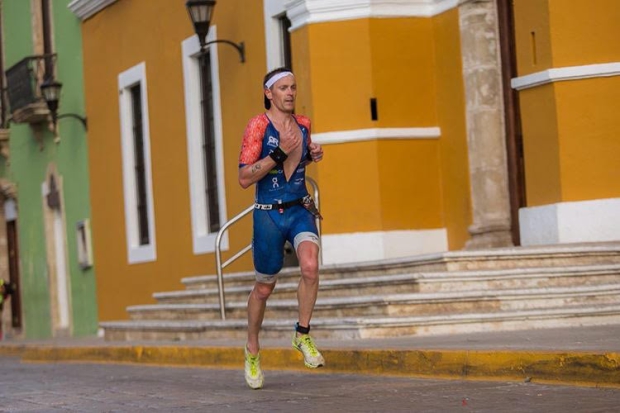
Slowtwitch: What challenges did you face in training leading up for this attempt? Did you train the same or differently as you would an ultra-distance triathlon?
Hanson: The main challenge was committing to the race and then having a few PTO and Ironman races pop up on the radar right before the event. I committed to this race in early August, then the PTO came out with a few grass roots events that they were going to support a pro field at and IM Cozumel 70.3 didn’t cancel. I felt like I needed to get on the triathlon start lines as soon as possible. So that put a bit of a wrench in the final prep.
Daerr: Like most people experienced, swimming in the early days of COVID was virtually impossible. From mid March to mid May I did not swim at all and then as swimming did become accessible, it became a highly sought after commodity (at least in Boulder). As a result, it wasn't easy to reserve much swim time and it was limited to 50-55 minutes at a time when I could get a lane. Eventually I decided to not try and stress too much over it and just do a minimal amount of swimming over the summer and hopefully demand would chill out a bit. By August I was finding it easier to get swim time and even more so in September, but I would still consider it to be less than I might have hoped for.
Running was a totally different story as I ran quite a lot in the early months of COVID. I backed off over the summer as I wanted to ride more, but in the last three weeks I dropped cycling from the schedule to ramp some run mileage back up. While I haven't really been doing lots of structured workouts, I have felt like my running is in a decent spot. How the two disciplines will play out together, I'm not really sure.
Roberts: At first the challenge was having a pool available for swimming, then once some pools opened, getting long enough pool reservation times to train. Unfortunately I haven’t had any pool reservation times longer than 1 hour, but I’ve managed multiple swims in a day by going to different pools and then swimming every day. Swimming multiple times a day and every day isn’t much different than when I’m training for triathlons; I just couldn’t get a solid 7-8k swim set in all at once at one pool like I’m used to doing.
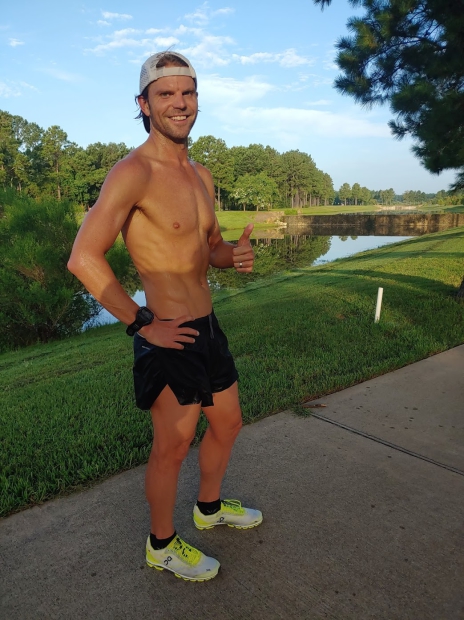
Slowtwitch: Have you given any consideration to how you will pace both the swim and run legs in order to complete each sport in under 3 hours?
Hanson: The weather is looking to be favorable for the swim, not so comfortable for the run. As long as the swim isn’t terribly choppy, I should be able to go out fairly conservative and just settle into a comfortable pace. Hitting 10km in under 3 hours shouldn't be terribly difficult, I just have to be conservative enough with the pacing and stay on the ball with nutrition so that I can still run well. I’m definitely not going to go out to try to kill the marathon. The heat will definitely be a factor. Also, because of the last 3 weekends of racing, I didn’t get the run mileage that I normally would leading into a marathon. The plan is to go out around a 6:00-6:10 pace. I’m not really sure how I will feel running after swimming for nearly 3 hours, so I’m not going to start paying attention to pace for the first 5 miles. I’ll just try to build a buffer on the 3 hour pace and hold it in the late stages of the race.
Daerr: I haven't ever done any swim/run events, but I have done one ultraswim of 14K when I swam in the Thames (wetsuit) in 2018. I was extremely intimidated by that long of a swim so I made it a point to try and swim the first 4K very easily. While the final 2K of that race was rough, I actually felt pretty good at the 10K mark so I'll probably try and repeat that strategy. As far as the run, I'm not really sure what to expect. I've run a lot of marathons off the bike, but never off the swim. I think the challenges will end up being very different. As to which one is more difficult, I'll have to tell you Sunday evening.
Roberts: Absolutely, that’s the first consideration I gave to this challenge. Luckily I’m a master of pacing and for the swim I plan to stay as “chill” as possible through the first 5k – maybe more – and then up the effort if I’m feeling good. That should keep me around the 3 hour mark. As for the run, I know exactly how to pace a sub 3 hour run while already fatigued. The wildcard is how quickly my legs come around after swimming for so long to allow me to lock into my sub-3 running pace.
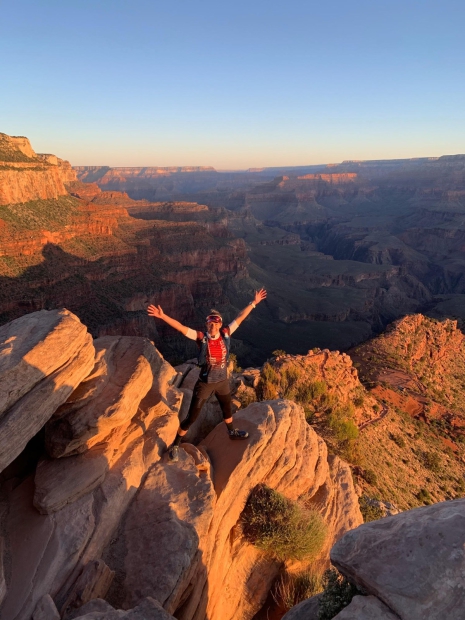
Slowtwitch: Tell us about the different types of equipment you'll plan to use and also an idea of what your nutrition plan will look like?
Hanson: It is weird traveling to a race with so little equipment. I’ll be swimming in my Quintana Roo Hydrospeed Swimskin then I’ll throw on my Ownway Apparel run shorts and singlet and the On Cloudboom running shoes. I’ll have a kayaker next to me during the swim. The plan is to take in a 1/2 bottle of First Endurance EFSpro every 2km and I’ll down one of the new EFS liquid shot prototypes every 4km. If all goes as planned, that will be a full water bottle and a gel an hour. On the run, I’ll treat it like an Ironman marathon and try to get fluids down every mile and a liquid shot down every 5 miles.
Daerr: My equipment will be pretty standard to what I would use in a triathlon without the bike. I will be wearing a swimskin during the swim (full leg) and then racing in a standard tri kit. I will use a sleeveless race kit versus a sleeved kit in this case.
For nutrition, I will plan to do feeds every 15 minutes on the swim for the first 90 minutes and then every 10 minutes to the finish. I'll be targeting about 400 calories per hour. Then on the run it will be more like an Ironman where I use a combo of gels, sports drinks and coke. I don't tend to have a lot of structure of how much I take in, or when, on the run. I typically go more by feel at that point.
Roberts: I plan to double up on my swim caps to help keep my body warm during the swim; I will wear a swimskin over my kit. We will have kayakers with us to help with feeding during the swim, so I’ll have all-liquid nutrition using PowerBar hydrogel and Nuun electrolytes in a bottle. This bottle will be tied to a rope so the kayaker can toss it to me, I can take a drink and then the kayaker can pull it back on board. Getting enough nutrition in during the swim will be critical to having not only a good swim, but setting up for the run without being overly depleted. Run nutrition will go as I do all my marathons in a long distance triathlon. Regularly taking in powergels, electrolyte drink and, of course…flat coke for that extra boost!
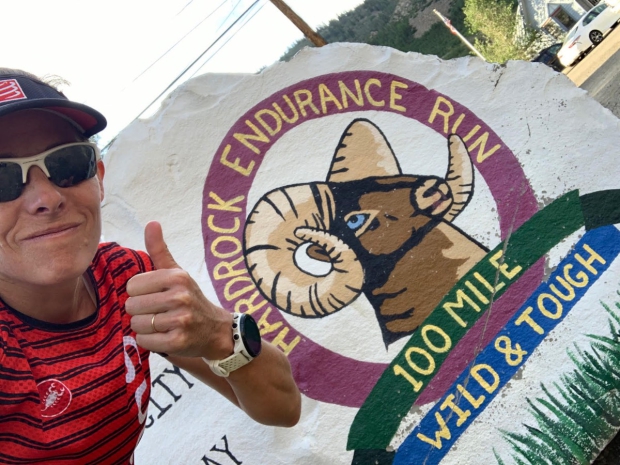
Slowtwitch: What do you think will be the most difficult part of the challenge?
Hanson: The biggest unknown for me is going to be the nutrition on the swim. The afternoon is looking to be in the low 90s which isn’t ideal marathon running weather. If you start that with a calorie deficit or already a bit dehydrated, it is going to be a long day. I’ve always struggled a bit trying to take in any sort of nutrition/hydration right before or during a swim. So that is the biggest concern leading into race day.
Daerr: All of it! If any part isn't, that'll be a nice bonus.
Roberts: The time between 7k and the finish of the swim will be the most difficult for me. I expect to be feeling a bit cold and ready to be out of the water and running!
Have a training buddy you think could manage this challenge? Weigh in on the vibrant forum thread on the challenge taking place even if merely to send your cramp-free wishes out to Matt, Justin and Lisa as they try to become the first known athletes to complete this monumental endurance feat.


